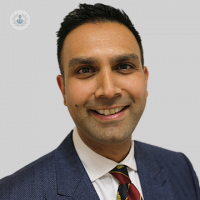The bottom line on haemorrhoids
Written by:If you haven’t had haemorrhoids, you probably know someone who has, as they are the leading cause of rectal bleeding. Whilst they are not always a serious problem, sometimes they do require more than just conservative treatments. Mr Amit Patel, a leading general and colorectal surgeon, explains how haemorrhoids become problematic and what treatments are available, ranging from conservative measures to surgical interventions.

What are haemorrhoids (piles)?
Haemorrhoids, or more commonly known as piles, are enlarged and engorged blood vessels within the anal canal. These blood vessels are part of the normal anatomy of the anal canal and usually cause no problems. However when they enlarge they are an extremely common cause of ‘bottom complaints’. These range from bleeding, itching and wetness to prolapse. When severe, they can become thrombosed (to help visualise, they have the appearance of a bunch of grapes at the anal entrance) and cause significant discomfort.
Haemorrhoids are often confused with external skin tags around the entrance to the bottom. These are not haemorrhoids but can often be a ‘hangover’ from previous external haemorrhoids which have since retreated and left some residual skin tag tissue externally.
Haemorrhoids can become engorged and swollen with certain conditions. The number one cause is after childbirth. However, haemorrhoids can affect females and males in equal measure. Up to a third of the population are thought to suffer from haemorrhoids. Hence, it is a very common complaint, and yet patients are often shy to seek help as they are embarrassed or fear the treatments on offer.
When do piles need surgery?
Surgery is recommended for piles when they become problematic for the patient and the symptoms don’t respond to conservative measures. Conservative measures include:
- Avoiding straining when on the toilet
- Using stool softeners
- Eating a high-fibre diet with plenty of liquids during the day.
- Avoiding repetitive strain to the pelvic floor – such as persistent lifting, prolonged constipation or diarrhoea.
If, despite adopting these measures, the patient is still experiencing symptoms, then surgical intervention may be indicated.
It is important to be aware that whilst piles are extremely common, there are other more serious causes for bleeding from the back passage. As such, in certain cases, it may be appropriate to perform a camera examination in the back passage prior to proceeding to haemorrhoid treatment to exclude other significant conditions.
What does haemorrhoids surgery involve?
Traditional haemorrhoid surgery involves the haemorrhoid being ‘cut out’ (haemorrhoidectomy). This can be a painful procedure where patients are unable to work for up to two weeks post-procedure.
Whilst there are still occasions where a formal haemorrhoidectomy is still clinically indicated, there are newer minimally-invasive or ‘incision-less’ surgical options. These range from ambulatory (walk-in, walk-out) techniques to day-case surgical options. These offer the advantage of less post-operative discomfort and a faster return to work for the patient. Intermittent bleeding and ‘jelly-like’ or mucus discharge can also be expected for up to two weeks and occasionally beyond.
Can haemorrhoids come back after being surgically removed?
There is a small risk of recurrence with haemorrhoids with any form of surgical treatment. That risk of recurrence can be minimised by ensuring that after treatment, the patient avoids straining, constipation or diarrhoea, as well as persistent lifting.
If you suffer from problematic haemorrhoids and cannot find relief with conservative measures, make an appointment with an expert to discuss next steps.


